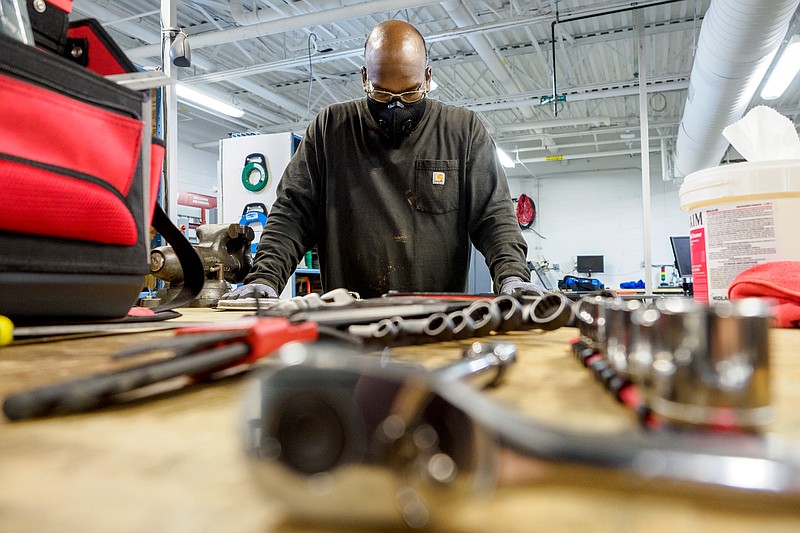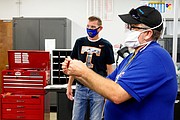The coronavirus pandemic halted life as Americans knew it in early March. Restaurants closed, companies sent their employees home to work remotely and a nationwide shutdown was implemented.
One of the most decisive dominoes that fell during that week was schools at every level closed and sent students home. From preschoolers to graduate students, people were sent back to their homes, dorm rooms and sometimes their native countries to start learning from afar.
Much of what was left of the spring semester was considered a loss in many classrooms around the country as the focus shifted to the fall semester. Over the summer, school districts, colleges and universities each put together a plan to reopen schools.
Enrollment for K-12 programs wasn't considered a major issue this summer, but it was for higher education institutions that were learning how to get back to school on the fly.
Because of the pandemic, millions of students who would have finished their senior year of high school with the dreaded standardized tests - an important step in the college admissions process - instead didn't take them.
The implementation of online courses has also muddied the waters of college enrollment that Chattanooga-region schools are still navigating today.
On Thursday, the National Student Clearinghouse Research Center released its first look at fall enrollment through Sept. 10 across the country. The results were not surprising: Fewer students signed up to attend college amid a public health crisis that is still very much an issue in the United States.
Of the 629 schools that responded to the center's survey, enrollment among undergraduates is down 2.5% this fall across all types of institutions. At the same time, graduate programs saw a 3.9% increase in enrollment, which would put overall enrollment down 1.8%.
Meanwhile, a recent U.S. census survey found that 16 million Americans have canceled plans to go to college, citing fears about the coronavirus and not being able to afford school at a time like this as the main contributors.
Chattanooga State Community College has seen a drop of about 7.4% in its credit-curriculum enrollment. Brad McCormick, assistant vice president for enrollment services at Chattanooga State, said on the 14th day of classes this fall, 7,452 students were on the books. That's down from 8,050 last year at the same time.
Chattanooga State is the only community college in Tennessee that has a College of Applied Technology. The TCAT portion of the college's enrollment shows a drastic drop in enrollment - 708 this year compared to 1,108 last year - but already there's good news on the horizon.
"They are actually already up to around 1,100 because they've been very actively adding students even as the semester is underway," McCormick said. "But on an apples-to-apples comparison, the number is substantially down in the TCAT."
McCormick said the drop in enrollment is mainly due to the fact the school can't have as many students in classrooms as in previous years.
"Because they are meeting largely in person, they kind of had to cap some things at a smaller level," he said. "As an enrollment person, I look at that and say, 'Oh my goodness, they're really down.' But they're down because they have to be down."
Jodi Johnson holds the same position as McCormick at Dalton State College. Dalton State's enrollment numbers have been better in a lot of areas that surprised Johnson, but they're still down.
"I will tell you, there's no problem getting a parking space this fall," Johnson joked.
Dalton State's enrollment numbers are down about 4% from last year - 4,964 to 4,776 - with still more time for students to register for classes that start in October.
The less crowded campuses at Dalton and the Chattanooga colleges are not solely because of enrollment but because students are taking either hybrid classes or strictly online ones.
"We have some dual-enrollment high school students who are picking up extra courses because they're in their high school courses virtually and they've decided they can pick up another course online," Johnson said.
Whitfield County has a large Hispanic population, and Johnson said she's been encouraged by the continued growth of the student body's share of Hispanic students even in the pandemic.
"Around 1 or 2% growth is about average for us, and we're seeing that again this year," she said. "It looks like we'll end up around 33% of our students self-identifying as Hispanic."
Johnson has also noticed a trend of more dual enrollment students, which surprised her after the Georgia legislature passed a bill limiting the number of courses high school students can take, as well as an increase in students signing up directly for a bachelor's degree pathway.
Bucking the national trend, enrollment at the University of Tennessee at Chattanooga is slightly up from a year ago. The official undergraduate count for the fall semester is 10,341, up from 10,297 from a year ago. Graduate students are also up from 1,354 to 1,387.
Colleges reopening amid the pandemic looks different from school to school. Most schools in the area are operating with a hybrid method of both online and in-person instruction.
As classes resumed this fall, some campuses made national news for being COVID-19 clusters.
According to figures compiled by The New York Times, Georgia ranks third in the country for states with the most cases reported on campus, with 6,943. Alabama is third with 6,249.
Tennessee has 2,768. UTC is tracking its own COVID-19 cases on a school dashboard and reports two faculty members and 38 students are considered "open" cases of the virus. Another 30 faculty members and 333 students are considered "closed" cases.
This week, a group of tenured University of Georgia faculty members called on school administrators to do more to prevent the people of Athens from getting the virus from the university population, which has dealt with outbreaks in the past month.
As of the past week, Dalton State reported having only one faculty member and 23 students who have tested positive for the coronavirus. The school requires masks to be worn in all buildings, and many people on campus have gone above and beyond to wear them outside while on campus.
Looking ahead to the spring semester, Johnson said some of the recruiting strategies she and her staff developed - like establishing one-on-one relationships with future students - has had to be put on hold due to the pandemic and the nature of a changing enrollment environment.
"Of course we've had to pivot and do a lot of that online," she said. "We're trying to make things more personalized. We're just reopened for in-person campus tours but not everybody is comfortable with that, so we're trying to work on some virtual tour options."
Dalton State is also in the process of designing a drive-thru preview day for prospective students to get the look and feel of the campus without any of the in-person risks.
The coming weeks and months are sure to include more planning, adjusting and adapting for colleges and universities.
Contact Patrick Filbin at pfilbin@timesfreepress.com or 423-757-6476. Follow him on Twitter @PatrickFilbin.

